This homemade eggnog recipe is smooth and creamy! It only takes a few steps and a few ingredients to have rich and delicious eggnog at home to share with your family and friends!
Eggnog is one of those things that people either seem to love or you love to hate. However, I think part of that has to do with the eggnog they have been drinking.
I recently learned how to make the most amazing homemade eggnog during a recent visit to the Ohio Poultry Association. You can read a little about that tour on my Chai Spice Meringue post.
I took that exact same Classic Cooked Eggnog recipe straight from the Ohio Poultry Association website and recreated it in my own kitchen. That’s when I realized the homemade eggnog is NOTHING like the cartons of eggnog you find in your grocery store!
If it’s boozy eggnog you like, then skip the eggnog liqueur too!
Where Does Eggnog Come From?
Historians may not be 100% sure of where eggnog originated, it may be derived from a medieval milk-based drink that over time found it’s the way to the US colonies were chickens (eggs), cows (dairy) and rum were available ingredients.
Why Is Eggnog A Christmas Drink?
Early colonists drank eggnog at Christmastime because it was warm and made with winter flavors like cinnamon, nutmeg, and vanilla. Its popularity grew and it gradually because synonymous with the holiday season!
What Is Eggnog Made With?
It doesn’t take many ingredients to make a really good homemade eggnog. For this recipe you will need:
Eggs– Large eggs or whatever you have in the fridge is fine.
Sugar – Granulated sugar
Milk – Whole milk would be great as the extra fat will help thicken the mixture. But heavy cream also works well in the recipe.
Vanilla – It’s best to use real vanilla as opposed to imitation.
Heavy Saucepan
When it comes to eggs, my home state, Ohio is one of the largest egg-producing states in the country with 31 million laying hens.
The eggs you buy in your local grocery store could be Ohio eggs and rest assured they are not only fresh but have been regulated by the Ohio Department of Agriculture to make sure you are getting the very best product.
There are some questions that always come up when it comes to eggs and one of them is do my eggs have antibiotics? Egg farmers may use a limited amount of antibiotics that have been approved by the FDA to keep their flocks free from disease, but because of good vaccinations, only a small portion of Ohio’s flocks receive antibiotics.
Are Organic, free-range, or pasture-raised eggs healthier than conventional eggs? There are quite a few safeguards and standards in place for commercial egg farmers; it is safe to say that conventionally raised eggs are just as healthy as specialty eggs. Which you buy is really a matter of preference. The farmers I have heard from often choose to serve their own families conventionally raised eggs. They are an economical source of quality protein.
How long can eggs be left out of the refrigerator? Shell eggs or hard-boiled eggs need to be placed in the fridge within two hours. Dishes made with eggs like quiches or egg casseroles need to be served immediately and refrigerated after serving.
How To Make Eggnog From Scratch
Place your saucepan over low heat. Place sugar, a pinch of salt, and eggs in the saucepan and stir to combine.
Slowly whisk in the milk or heavy cream.
Cook the mixture on low heat stirring constantly (but slowly). The mixture will thicken. When it coats the back of a spoon and reaches a 165-degree temperature, remove the mixture immediately from the heat.
Stir in the remaining milk and the vanilla.
Refrigerate covered, several hours, or overnight or until thoroughly chilled. The mixture should be smooth and thick.
Any alcohol can be stirred into the mixture just before serving.
What Alcohol Goes Well With Eggnog
Eggnog pairs well with earthy flavors like nutmeg and cinnamon, so when you are thinking about adding alcohol, try to use spirits with warm undertones like brandy, bourbon or spiced rum.
How Long Does Eggnog Last?
Store your homemade eggnog recipe in the refrigerator. Eggnog will last 2-3 days.
Don’t worry if you have alcohol in your leftover eggnog, the alcohol should kill any bacteria (NOTE: I am not a food-safety expert, so please your best judgment on this)
Tips For Homemade Eggnog Recipe
Here are a few suggestions taken directly from the Ohioeggs.com website:
- Using a heavy saucepan over low heat and stirring constantly are the keys to success when it comes to making eggnog.
- If you increase the temperature to hurry the process, then the mixture will curdle.
- Stirring constantly will prevent the mixture from scorching.
- Watch carefully and test frequently, after about 10-12 minutes the mixture should coat the back of a spoon. Undercooked eggnog will be thin and watery; overcooked eggnog will have lumps sort of like scrambled eggs. The difference between the two are only a few degrees.
- Pour your eggnog through a mesh sieve to get smooth eggnog.
- To keep eggnog cold when entertaining, set a punch bowl or a pitcher in a bed of ice or freeze some of the eggnog in ice cube tray to keep it nice and cold!
Use leftover eggnog in Eggnog Cream Cheese Pound Cake, Eggnog Ice Cream Floats, or Eggnog Dutch Baby.
Homemade Eggnog Recipe
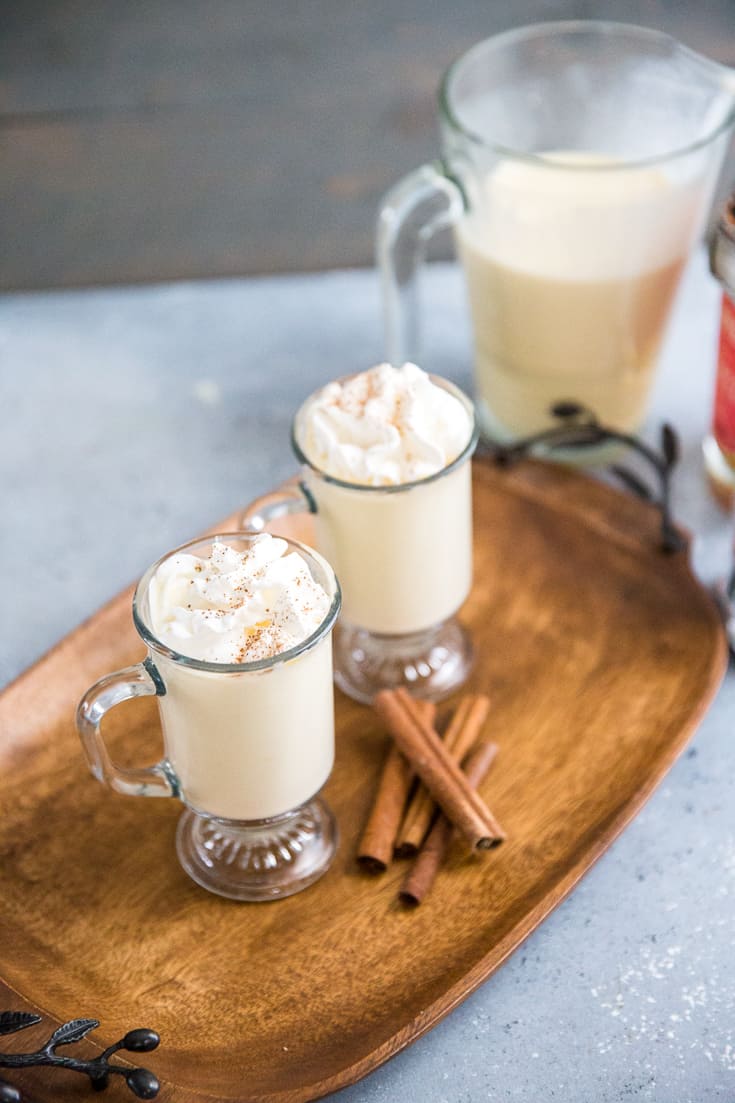
This homemade eggnog is nothing like what you find in stores! It is luxuriously rich and creamy! Add your favorite spirits to make it extra special!
Ingredients
- 6 large eggs
- 1/4 cup sugar
- 1/4 teaspoon salt
- 4 cups whole milk, divided
- 1 teaspoon vanilla
- cinnamon sticks, nutmeg or whipped cream for garnish
Instructions
- Beat eggs, sugar, and salt in a heavy saucepan set over low heat until blended. Stir in 2 cups of milk.
- Cook the mixture over low heat, stirring constantly but slowly and gently. The mixture will begin to thicken.
- Cook until the mixture coats the back of a spoon or reaches 165 degrees, which should take about 15 minutes. Remove from heat.
- Stir in the remaining 2 cups of milk and the vanilla. Cover and refrigerate until thoroughly chilled; several hours or overnight.
- Add alcohol if using just before serving.
- Serve with cinnamon sticks. Top with whipped cream and a dusting of nutmeg if desired.
Nutrition Information
Yield
12Serving Size
1Amount Per Serving Calories 105Total Fat 5gSaturated Fat 2gTrans Fat 0gUnsaturated Fat 2gCholesterol 102mgSodium 115mgCarbohydrates 9gFiber 0gSugar 8gProtein 6g
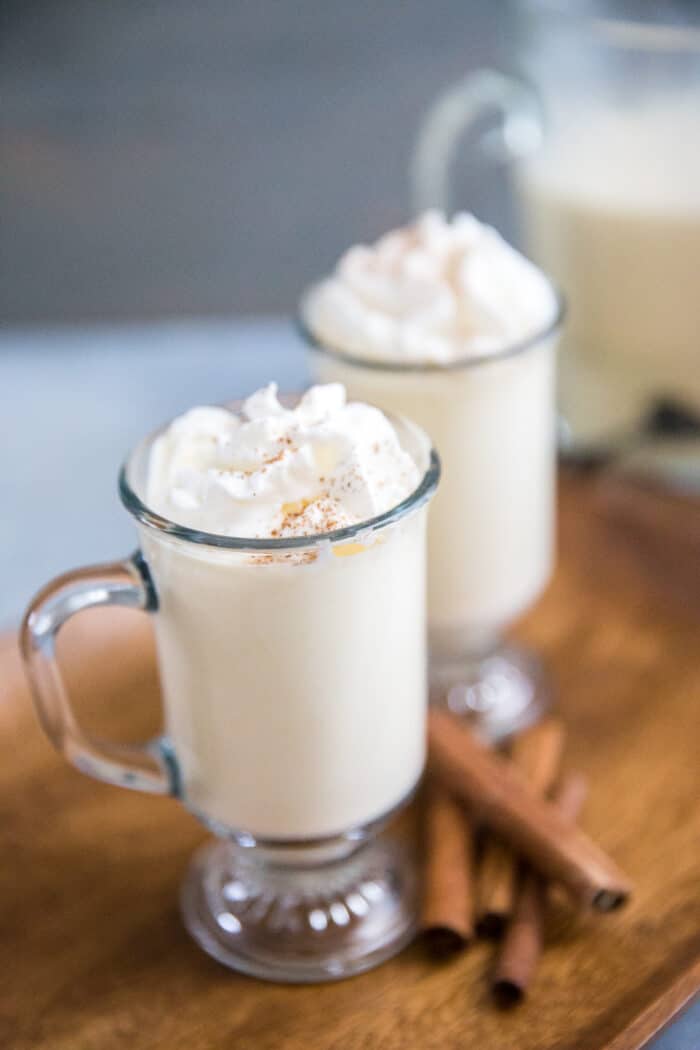
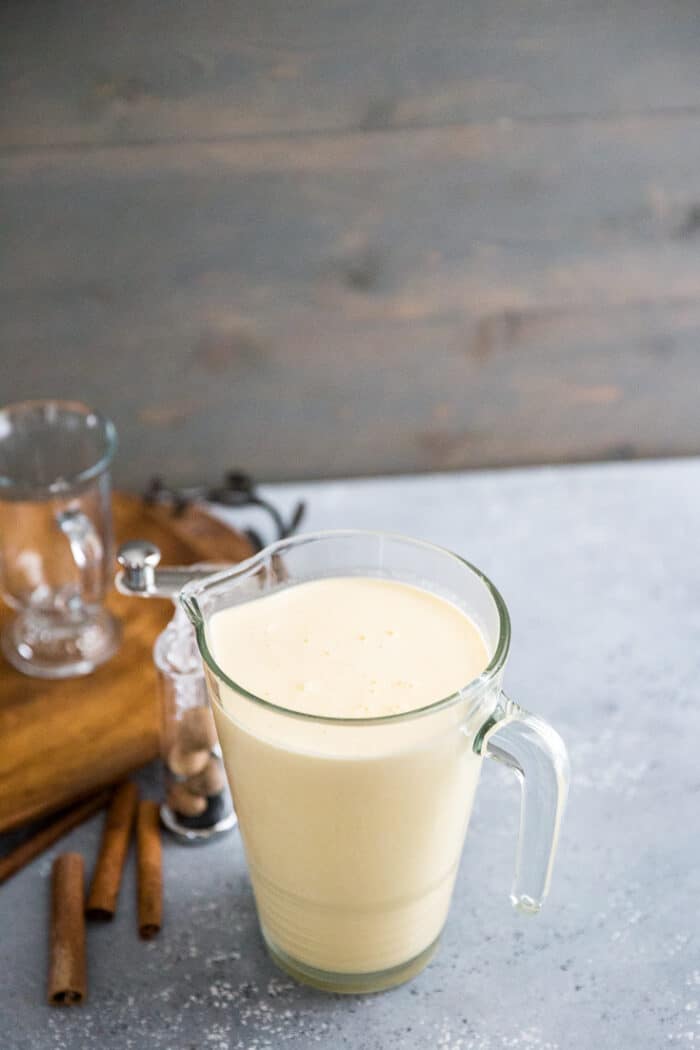
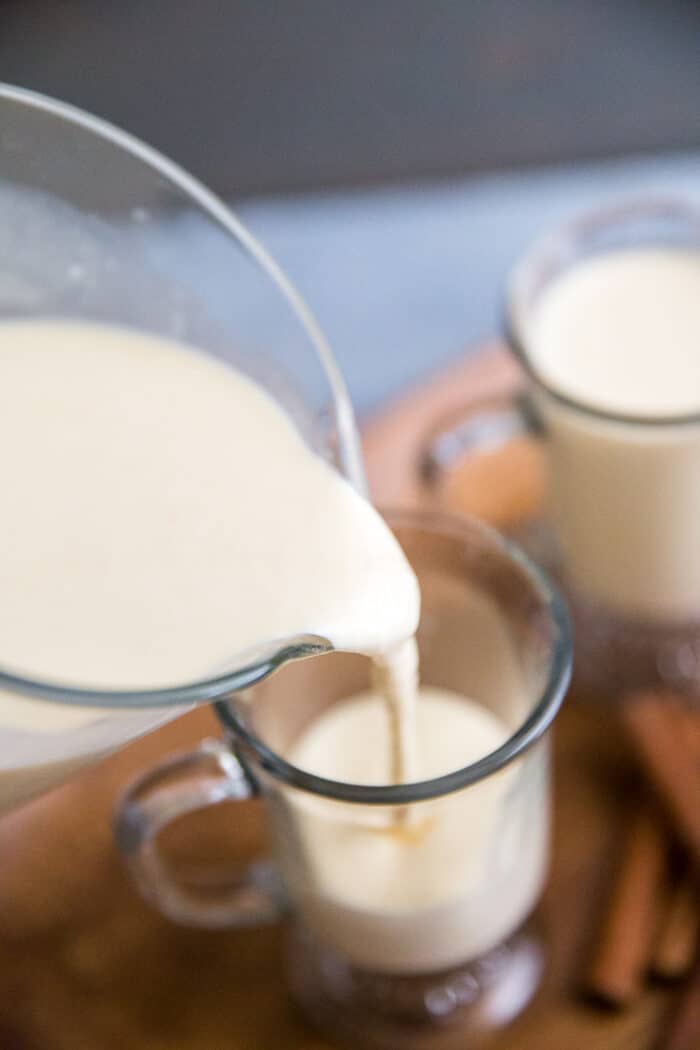
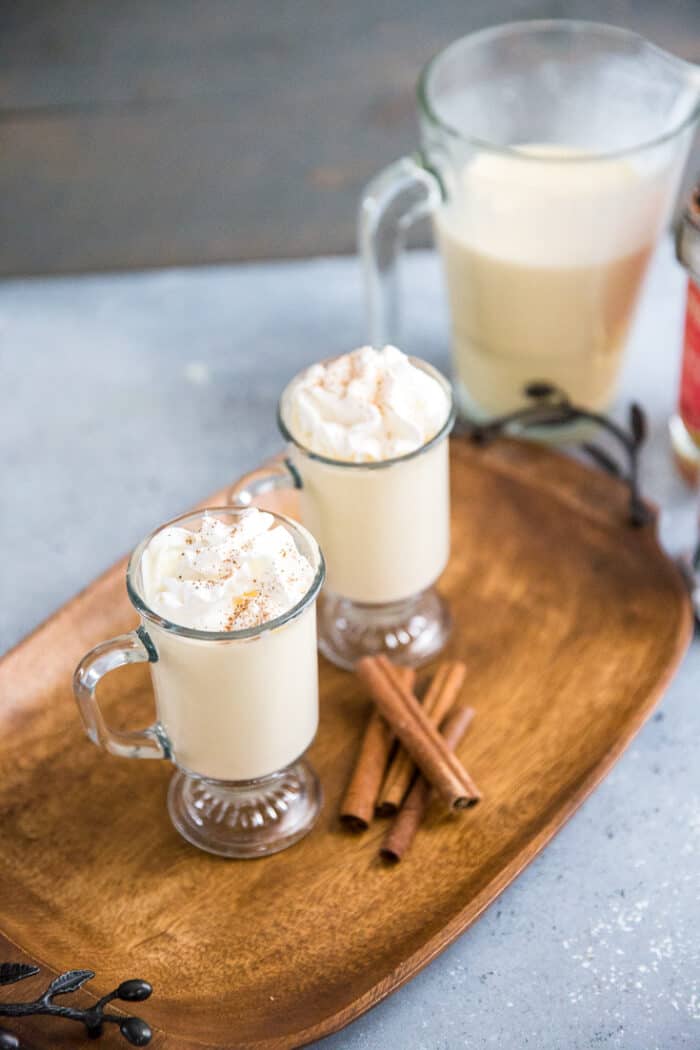
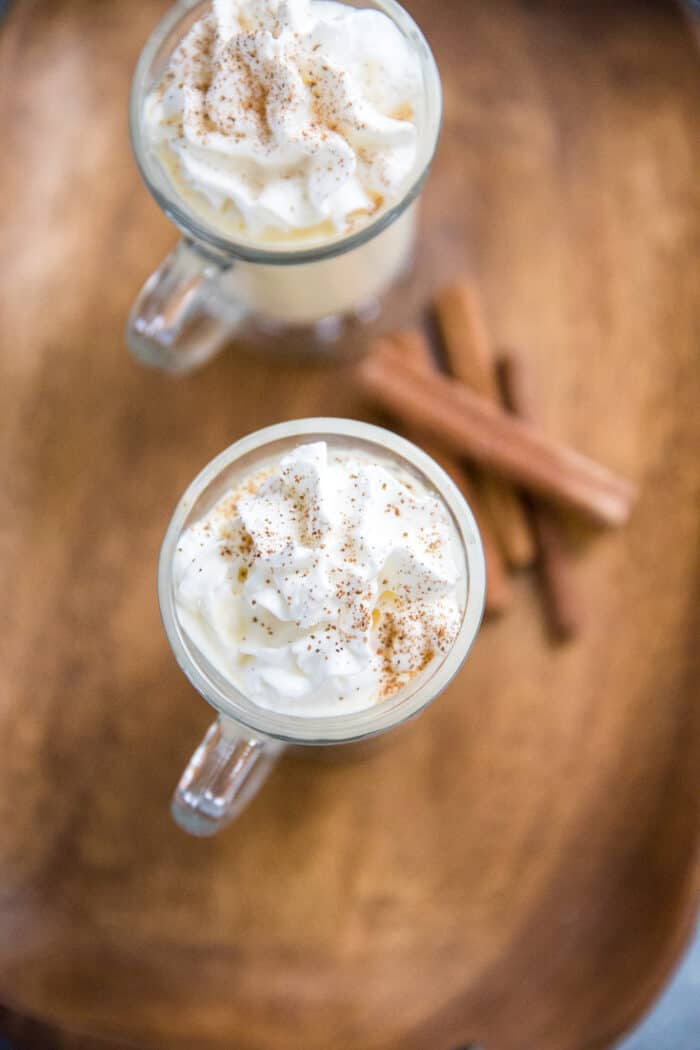
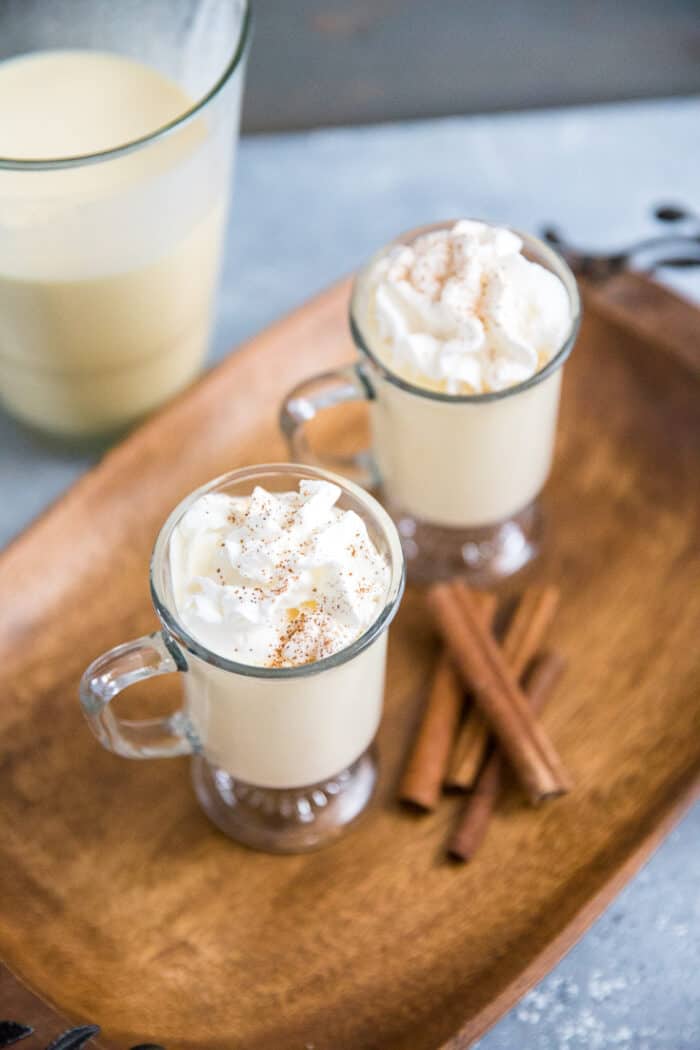
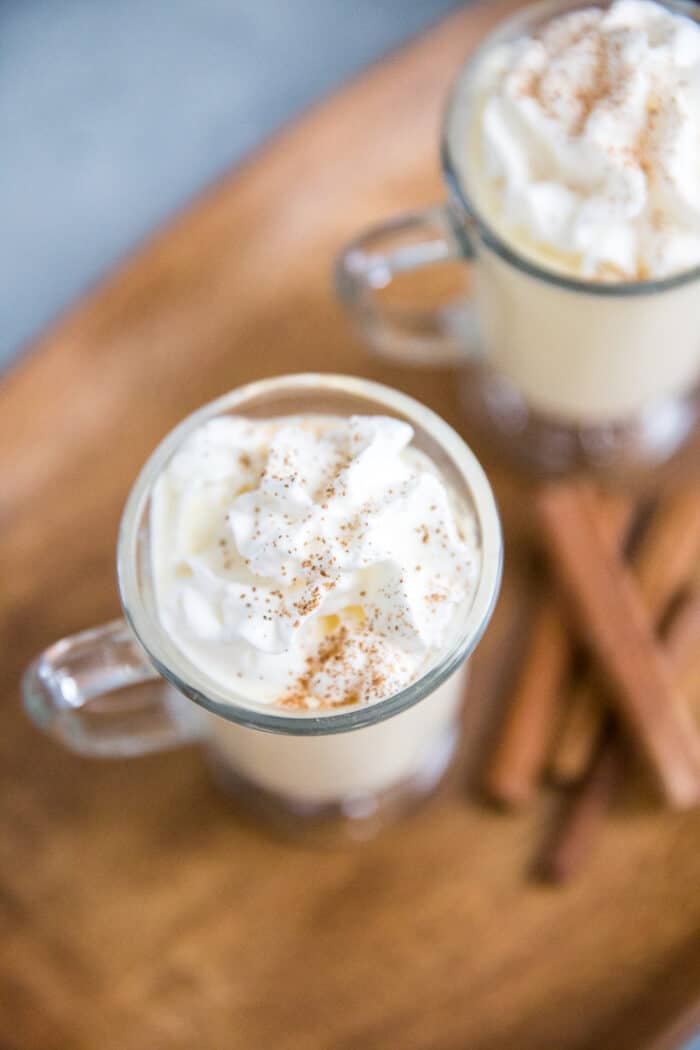
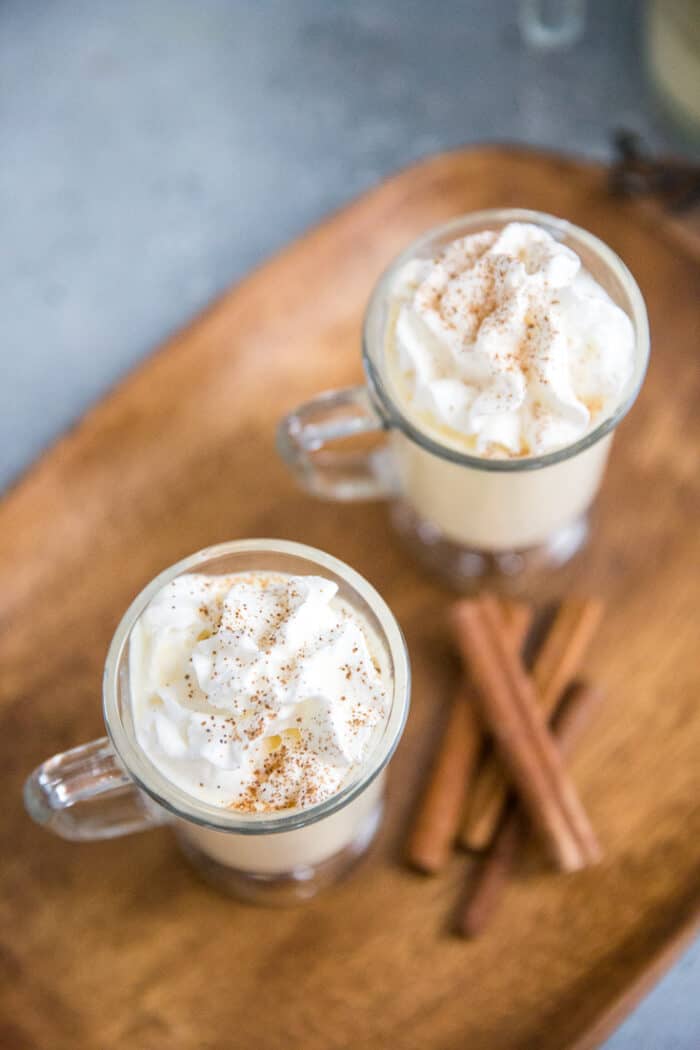
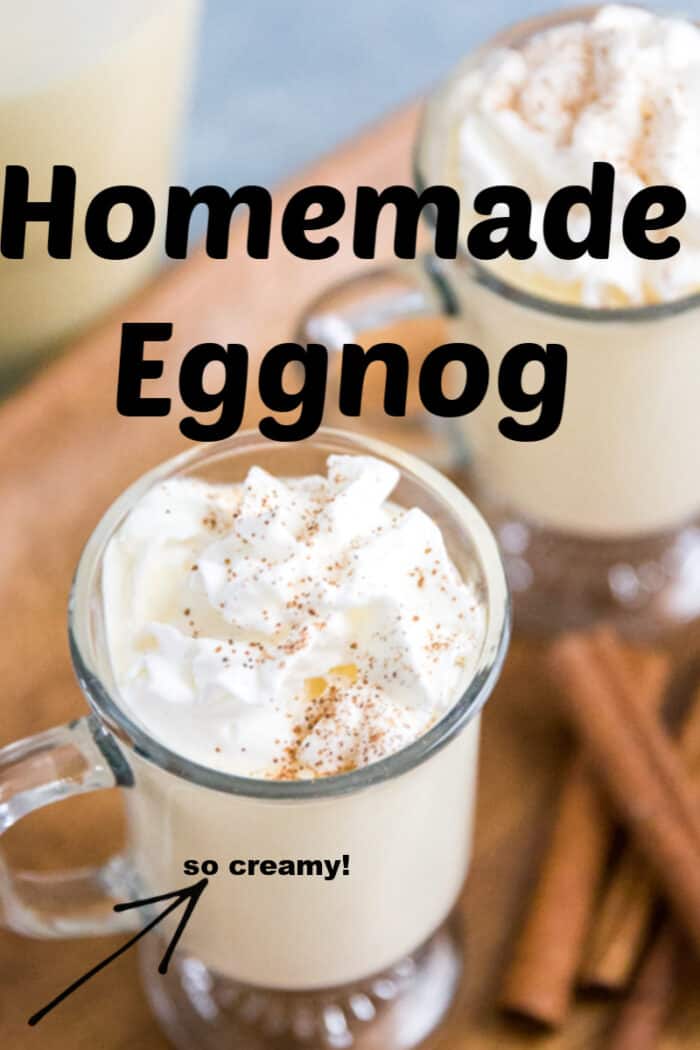
Shirley says
I wanted to know do you use the whole egg,I seen some recipes say use just egg yolk iam try this one just add alcohol Thanks
Tanya Schroeder says
Hi Shirley, all the eggs are whole eggs and they all get whisked with the sugar in the saucepan.